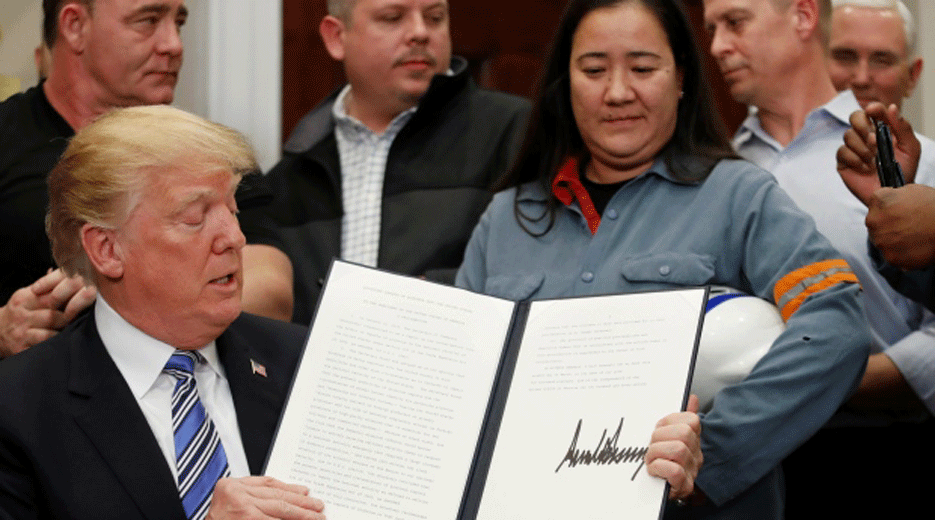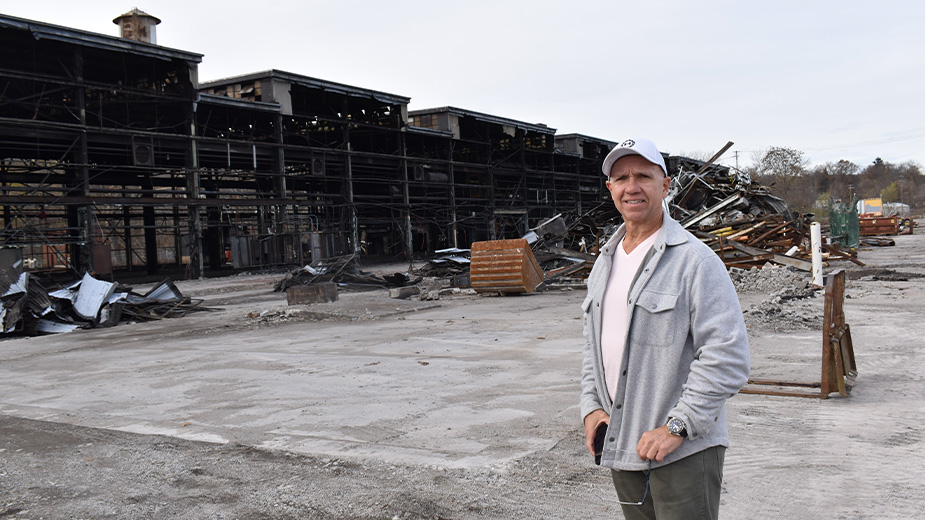Manufacturers Await Tariffs that Ryan Calls ‘Disaster’
YOUNGSTOWN, Ohio — Local manufacturers say it’s still too early to ascertain the impact of President Donald Trump’s decision to impose stiff tariffs on steel and aluminum imported from some of the United States’ closest allies and trading partners.
“People can’t panic yet because we don’t know if it affects semi-finished steel or raw product,” says Rob Folsom, executive vice president at Compco Industries in Columbiana. “So far, it hasn’t affected us a great deal.”
Trump announced Thursday that a 25% tariff on steel and 10% on aluminum imported from Canada, Mexico and the European Union would take effect at midnight. The measures were first announced in March, but the administration delayed action in order to negotiate what it considers better trade deals with these countries.
Exemptions were extended to Canada and Mexico to give trade negotiators time to work out an amended North American Trade Agreement, or NAFTA. Similar extensions were awarded to European Union countries to achieve the same purposes.
However, these countries have been reluctant to readily concede to U.S. propositions and the exemptions expired at midnight.
Earlier this week, the Trump administration said it would move ahead with imposing tariffs on $50 billion worth of goods imported from China and take action to reduce Chinese investment in the United States.
China, Mexico and the EU have all said they would respond with sanctions directed at U.S. imports to their countries, escalating what could morph into an all-out global trade war.
Meanwhile, the administration has cut unilateral trade deals with South Korea, Argentina, Australia and Brazil – countries that aren’t affected by the tariffs.
Compco’s Folsom said that manufacturers and steel processors that normally purchase steel or aluminum from foreign sources would now buy their material mostly from domestic mills. This will likely cause the price of steel to rise, which means higher material costs for automotive and other manufacturers that use steel or aluminum to produce cars, trucks, appliances or aircraft.
Compco manufactures metal tank heads for different industries and operates two other plants that use steel to produce components in the stamping and automotive industries. Most of the steel the company purchases originates from domestic mills.
As business increases at local steel mills, so too will prices, and manufacturers would have to adapt, Folsom said.
“It will affect everybody,” he said, though he cautions he’s still not clear as to which particular products would be affected.
He suspects the tariffs placed on the EU, Mexico and Canada are measures to prevent Chinese made steel or semi-finished products from entering the U.S. via these countries.
In the past, penalties on Chinese steel and metal products proved largely ineffective because steel produced there would be shipped to Canada, processed there, and then shipped to the U.S. as a Canadian import.
“There has to be fair trade,” Folsom said. “We don’t have that with China.”
China has threatened to retaliate with trade sanctions of its own on $50 billion worth of U.S. exports that include automobiles, aircraft and soybeans.
Mexico, Canada and the EU have also threatened to respond with duties placed on U.S. products such as motorcycles, agricultural goods, orange juice, and Kentucky bourbon, among other items.
U.S. Rep. Tim Ryan, D-13, on Thursday urged Trump to reverse his decision to levy the penalties on Canada and the EU, citing their role as strong trade partners and long history as vital allies that supported the United States in times of global crisis.
“This decision could be a disaster if not overturned soon,” Ryan said in a statement. “Of particular concern, we are punishing our friends in Canada and Europe who have similar –and in some cases, stronger – worker protections and environmental standards.”
Moreover, initiating such trade action, the congressmen continued, strains the political alliance between the U.S., Canada, and their European allies and plays into the hands of adversaries such as Russia.
“This dangerous approach furthers the interests of Russia and China by weakening the friendships and alliances that helped us win World War II and the Cold War and propelled the United States to be a leader in the world for the last 75 years,” he said.
Ryan, long an advocate of taking punitive trade measures against China, sent a letter to Trump in March urging that he exempt key trading partners such as the European countries from the blanket tariffs announced earlier.
However, the chorus of criticism on Thursday came from the president’s own party.
U.S. Sen. Lamar Alexander, R-Tenn., said that the measures would “raise prices and destroy manufacturing jobs, especially auto jobs, which is one-third of all Tennessee manufacturing jobs.” The tariffs, the senator noted, was “basically higher taxes on American consumers.”
Republican senator Ben Sasse of Nebraska called the tariff policy “dumb,” drawing parallels to similar measures that closed off European markets during the 1920s and fueled the fire of the Great Depression of the 1930s.
“Europe, Canada and Mexico are not China, and you don’t treat your allies the same way you treat your opponents,” he remarked. “‘Make America Great Again’” shouldn’t mean ‘Make America 1929 Again.’ ”
Pictured: President Donald Trump holds the tariff proclamation he signed in March.
Copyright 2024 The Business Journal, Youngstown, Ohio.



